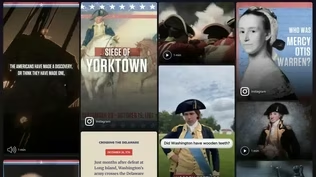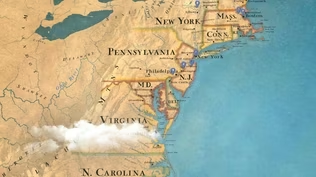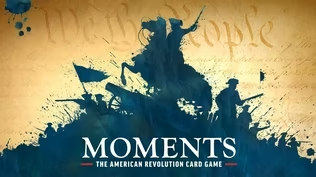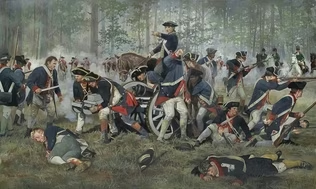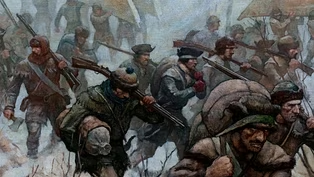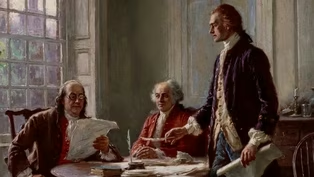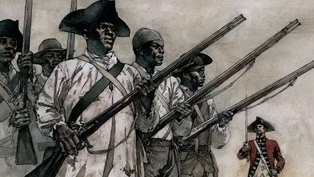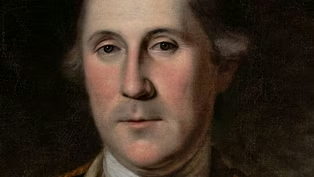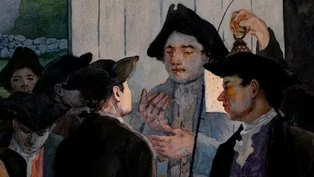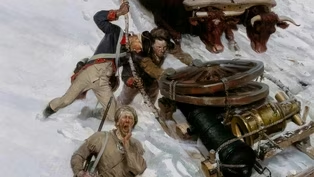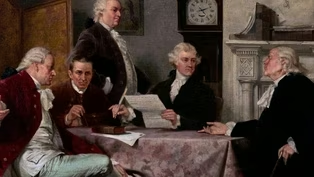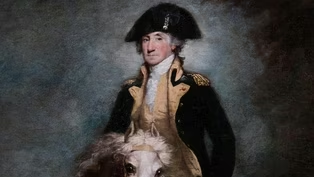
"Common Sense" and the Birth of a New World
Clip: Episode 2 | 6m 36sVideo has Closed Captions
"Common Sense" awakens the American colonies to the idea of true independence.
On January 9th, 1776, the pamphlet "Common Sense" is published in Philadelphia. The pamphlet immediately becomes a bestseller, selling tens of thousands of copies across America. In "Common Sense," Thomas Paine, the author and violent foe of aristocracy and monarchy, attacks the King and Parliament and offers Americans an alternative to British rule: true independence.
Problems playing video? | Closed Captioning Feedback
Problems playing video? | Closed Captioning Feedback
Episodes presented in 4K UHD on supported devices. Corporate funding for THE AMERICAN REVOLUTION was provided by Bank of America. Major funding was provided by The Better Angels Society and...

"Common Sense" and the Birth of a New World
Clip: Episode 2 | 6m 36sVideo has Closed Captions
On January 9th, 1776, the pamphlet "Common Sense" is published in Philadelphia. The pamphlet immediately becomes a bestseller, selling tens of thousands of copies across America. In "Common Sense," Thomas Paine, the author and violent foe of aristocracy and monarchy, attacks the King and Parliament and offers Americans an alternative to British rule: true independence.
Problems playing video? | Closed Captioning Feedback
How to Watch The American Revolution
The American Revolution is available to stream on pbs.org and the free PBS App, available on iPhone, Apple TV, Android TV, Android smartphones, Amazon Fire TV, Amazon Fire Tablet, Roku, Samsung Smart TV, and Vizio.
Buy Now
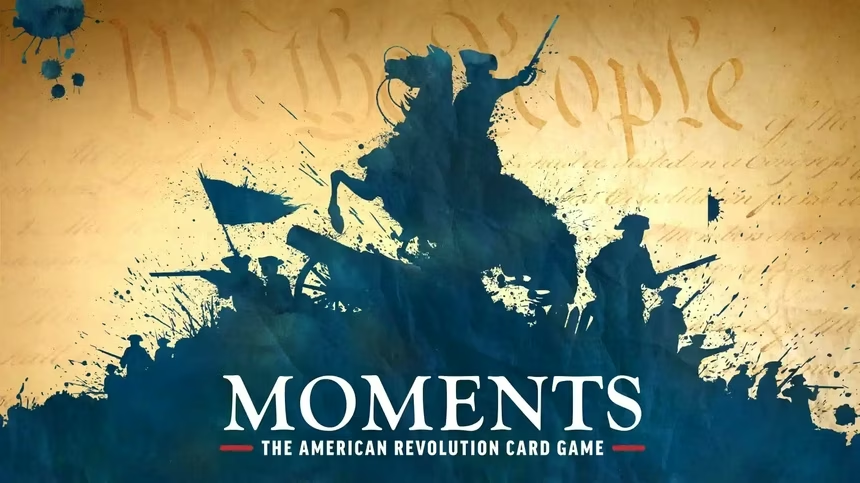
MOMENTS: The Revolutionary War Card Game
Use your knowledge of Revolutionary-era moments to build a timeline of real historical events.Providing Support for PBS.org
Learn Moreabout PBS online sponsorshipVoice: If we must erect an independent government in America, a republic will produce strength, hardiness, activity, courage, fortitude, and enterprise.
But there is so much rascality, so much venality and corruption, so much avarice and ambition, such a rage for profit and commerce among all ranks and degrees of men, even in America, that I sometimes doubt whether there is public virtue enough to support a republic.
John Adams.
Taylor: The leaders of the American Revolution need popular support.
The leaders of the American Revolution are going to have to make promises that there's going to be greater social mobility; there's going to be greater respect for common people; there is going to be broader political participation in the future than there has been in the colonial past by loosening up structures of authority, including structures of religious authority.
If you're making this Revolution and you need the support of thousands of common people, men and women, what's in it for them?
Gordon Wood: Up to the 18th century, people assumed that everything will always remain the same.
But the idea that you could take charge and change your culture, that's what--that's the fundamental basis of the Enlightenment, that man can be changed.
♪ Voice: The sun never shined on a cause of greater worth.
'Tis not the affair of a city, a country, a province, or a kingdom, but of a continent.
Everything that is right or natural pleads for separation.
Every spot of the old world is overrun with oppression.
Freedom hath been hunted round the globe.
O!
receive the fugitive, and prepare in time an asylum for mankind.
♪ We have it in our power to begin the world over again.
A situation similar to the present hath not happened since the days of Noah until now.
The birthday of a new world is at hand.
[Thomas Paine] ♪ Narrator: On January 9th, 1776, a slender pamphlet titled "Common Sense" was published in Philadelphia-- the most important pamphlet in American history.
It was signed simply "an Englishman."
Its author, a recent newcomer to America, was 38-year-old Thomas Paine.
The son of a Quaker corset-maker and his Anglican wife, Paine had failed at his father's profession, lost his first wife and their child in childbirth, been fired from his post as tax collector, endured the collapse of a second childless marriage, and had seen his possessions auctioned off to pay his debts.
During his 8-week voyage from Britain, he'd contracted typhus, and when his ship reached Philadelphia, he had to be carried off, half-dead.
But Paine was a master with words, skillfully weaving the latest Enlightenment philosophy with biblical references that everyone knew.
And he was a violent foe of aristocracy and monarchy.
Schiff: It's a much more radical document than anything that had preceded it.
"Common Sense" takes off like an accelerant through the colonies.
[Indistinct chatter] Everyone reads it.
Narrator: Excerpts from "Common Sense" appeared in newspapers throughout the colonies.
The pamphlet would sell tens of thousands of copies.
Taylor: It is an unprecedented bestseller.
With the exception of the Bible in the colonies, no book has been read as widely as "Common Sense" is.
Bernard Bailyn: It was a wholesale attack on the entire world of Britain-- political, cultural.
And it's in slam-bang prose.
No American pamphleteer wrote that kind of really tough extreme language.
Hogeland: It just made people listen and made people think at a time when the Congress would never have thought of attacking the King personally, King George III, the "Crown of England."
They were always like, "Oh, he's not really getting it.
"It's Parliament that's our problem.
The King needs to help us."
He just called the King a "beast," in print.
He was the working-class intellectual.
His politics were radically democratic, in many ways.
And that made him different from the other famous Founders.
Voice: Hereditary succession is an insult and an imposition on posterity.
For all men being originally equals, no one by birth could have a right to set up his own family in perpetual preference to all others forever.
One of the strongest natural proofs of the folly of hereditary right in kings is that nature disapproves it, otherwise she would not so frequently turn it into ridicule by giving mankind an ass for a lion.
[Thomas Paine] Bailyn: That pamphlet did stir people's minds about the possibility of a different kind of world.
Voice: "Common Sense" struck a string which required a touch to make it vibrate.
The country was ripe for independence, and only needed somebody to tell the people so.
Private Ashbel Green.
Hogeland: Some of the Founders, and others, thought this is the moment we can start over again.
We can actually begin the world anew.
And it must have been, you know, wildly exciting at the time.
And I think it still excites us, that we are the product of a revolutionary moment where the world turned upside down.
Voice: My countrymen will come reluctantly into the idea of independency.
I find "Common Sense" is working a wonderful change in the minds of many men.
George Washington.
♪
Video has Closed Captions
Clip: Ep2 | 8m 18s | Benedict Arnold's army braves the fierce winter to attack Quebec City in Canada. (8m 18s)
The Declaration of Independence & Birth of the United States
Video has Closed Captions
Clip: Ep2 | 11m 47s | Thomas Jefferson writes the Declaration of Independence and proclaims all men are created equal. (11m 47s)
Dunmore's Proclamation & Black Americans in the Revolution
Video has Closed Captions
Clip: Ep2 | 9m 20s | Royal governor Lord Dunmore offers freedom to enslaved people that fight their Patriot masters. (9m 20s)
George Washington: Farmer, Patriot, Commander
Video has Closed Captions
Clip: Ep2 | 4m 56s | George Washington assumes command of the Continental Army and must turn it into a unified force. (4m 56s)
John Peters... an enemy to Congress?
Video has Closed Captions
Clip: Ep2 | 2m 5s | John Peters was the most respected man in his small settlement until the First Continental Congress. (2m 5s)
One of the Most Extraordinary Expeditions in American History
Video has Closed Captions
Clip: Ep2 | 6m 56s | Henry Knox leads a daring expedition to deliver artillery from Fort Ticonderoga to Boston. (6m 56s)
Preview: An Asylum for Mankind
Video has Closed Captions
Preview: Ep2 | 30s | Washington takes command of the Continental Army. Congress declares American independence. (30s)
Video has Closed Captions
Clip: Ep2 | 52s | Extolling Washington's qualities in leadership, command and mental faculties. (52s)
Bunker Hill Aftermath, June 17, 1775
Video has Closed Captions
Clip: Ep2 | 57s | On June 17, 1775, the British took the high ground, but at tremendous cost. (57s)
Providing Support for PBS.org
Learn Moreabout PBS online sponsorshipSupport for PBS provided by:
Episodes presented in 4K UHD on supported devices. Corporate funding for THE AMERICAN REVOLUTION was provided by Bank of America. Major funding was provided by The Better Angels Society and...

